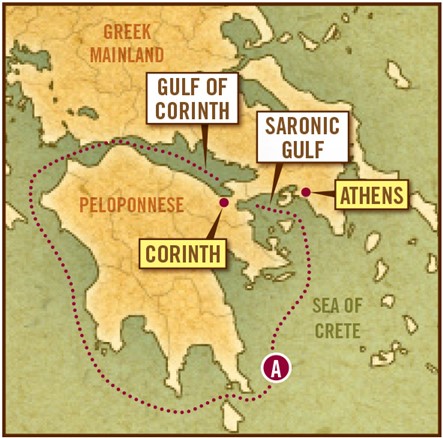
Oh, Corinthians
Monday, February 5, 2024
*Dan Gonzalez
This Sunday at Mass we’ll hear a reading from I Corinthians. We actually have been reading from the Epistle for the past few weeks. But did you know that the word “Corinthian” means more than just “something relating to the city of Corinth?” Here’s the dictionary definition:
Co-rin-thi-an adj.
- Of or relating to ancient Corinth or its people or culture.
- Architecture of or relating to the Corinthian order.
- Elegantly or elaborately ornate.
- Given to licentious and profligate luxury.
I’d like to draw your attention to the fourth entry. What is “licentiousness?” Well, here’s another definition: li-cen-tious adj. Lacking moral restraint, especially in sexual conduct.
How did this small ancient Greek town get such a bad reputation? The answer lies in its geography.

WHERE IN THE WORLD?
The city of Corinth lies about 48 miles west of Athens on a narrow stretch of land that joins the Peloponnesian peninsula to the Greek mainland. The thin isthmus, roughly 4 miles (6.4 km) across at its narrowest, blocked access to ships wanting to navigate between the Gulf of Corinth and the Saronic Gulf. Sailors wishing to cross the land-bridge had to place their ships on rollers and move them on dry land across a limestone-paved path named the Diolkos.
Alternately, if the ship was too big, all its cargo was removed, transported on land, and loaded onto a second ship at the other end. This sped up the transport of goods as sailing around the peninsula would have added an extra 185 nautical miles (see map). Because of all this trade traffic, Corinth became a major city — a thriving commercial center with a booming economy to the point of excess.
Construction of a canal through the isthmus began under Nero but was abandoned. In 1893, the four-mile Corinth canal was finally completed. Technically, the canal, which cuts through the narrow isthmus, transformed the Peloponnesian peninsula into an island. The appetites of the transient sailors and traders, as well as legal temple prostitution, contributed to the port’s moral depravity.
The Temple of Aphrodite, the Greek goddess of love, beauty and sexual desire, stood atop the Acrocorinth. Strabo, a first century Greek historian, chronicled the female temple servants there:
“The temple of Aphrodite was so rich that it employed more than a thousand hetairas... Many people visited the town on account of them, and thus these hetairas contributed to the riches of the town: for the ship captains frivolously spent their money there...” (Strabo VIII, 6, 20)
Strabo goes on to mention that the women were earning money with their bodies (XII, 3, 36). The city catered to the physical desires of mariners and merchants alike and was notorious for its licentiousness all over the ancient world. In fact, to refer to a woman as a Corinthian lass meant her morals were in question.
THE CHURCH IN CORINTH
The Corinthian Church, although it had some very affluent members, was largely made up of artisans, freedmen and slaves. The class stratification may have contributed to rivalries and elitism in the church. Some were claiming to have a more profound wisdom, a deeper spiritual insight and a higher status than others. When celebrating the Lord’s Supper, the wealthy would eat in excess, while the poor would go hungry.
“In giving this instruction, I do not praise the fact that your meetings are doing more harm than good... for in eating, each one goes ahead with his own supper, and one goes hungry while another gets drunk.” (1 Corinthians 11:17, 21)
Paul sent letters to the Corinthian Church to address these concerns and appeal for peace and harmony.
Paul’s farewell in his second letter to the Church in Corinth is the source for the first formula that may be used as the greeting at Mass. Hope this sounds familiar:
“Finally, brothers, rejoice. Mend your ways, encourage one another, agree with one another, live in peace…The grace of the Lord Jesus Christ and the love of God and the fellowship of the holy Spirit be with all of you.” (2 Corinthians 13:11-13)
Paul’s parting words of reconciliation, peace and encouragement to the Corinthian Church are also one of the clearest references to the Trinity in Scripture. Having this historical background on the Corinthian Church may help in understanding these Second Readings.


Comments from readers